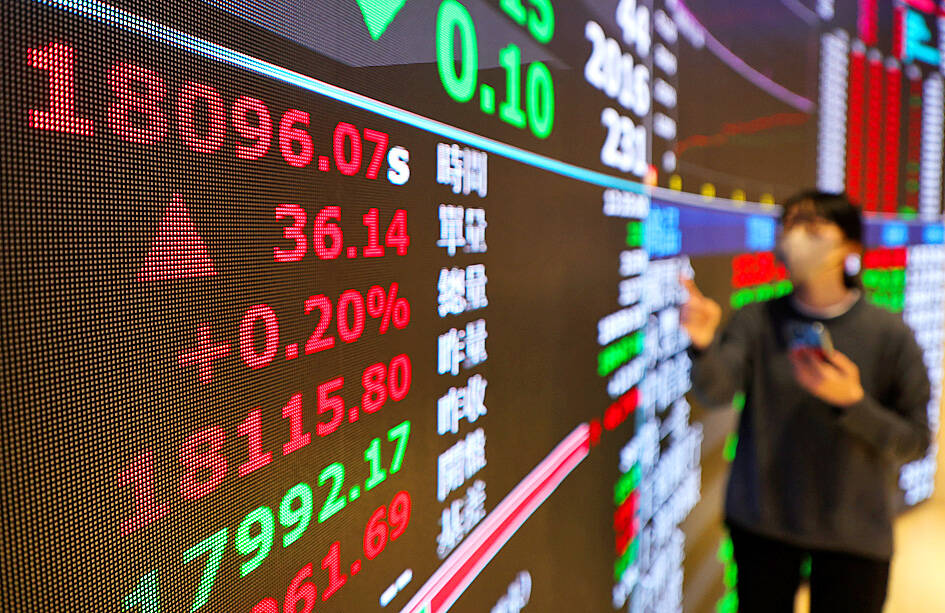The consumer confidence index this month rose to a two-year high, with five of the six subindices increasing, a report released yesterday by National Central University showed.
The index grew 1.08 points month-on-month to 73.22 — its fifth consecutive increase — while on an annual basis, it rose 10.75 points, the report said.
The latest index is the highest since February 2022 when the gauge printed 73.19, indicating that the public’s sentiment had returned to the level seen prior to Russia’s invasion of Ukraine, it said.

Photo: CNA
The report is based on a survey of 3,020 people aged 20 or older from across Taiwan between Feb. 18 and Wednesday last week, the university said.
Five of the six subindices used to gauge the public’s confidence over the next six months rose, signaling improved sentiment toward consumer prices, household finances, the economic climate, job opportunities and stock investments.
People’s expectations of stock investments climbed the most, increasing 3.17 points from last month to 61.85, the highest since March 2020.
The TAIEX has recently been at high levels driven by an artificial intelligence boom, the report said.
The survey showed that 27.2 percent of those polled said they would invest in stocks in the next six months, compared with 26.6 percent last month, while 65.3 percent said they would stay away from the market in the near term, down from 67.9 percent last month.
The subindex on job opportunities increased by the second largest amount, moving up 0.99 points to 70.23, followed the household finances subindex, which rose 0.89 points to 79.39, while the subindex on the economic climate grew the least among the five subindices, increasing 0.65 points to 83.59, the report said.
Buying interest in durable goods over the next six months was the only subindex to drop, declining 0.06 points month-on-month to 112.02.
Of the respondents, 44.4 percent said they intended to purchase durable goods over the next six months and 22.9 percent said they would be cautious about buying, compared with 45.2 percent and 23.9 percent respectively last month, the survey showed.
While the confidence index rose this month, five of the subindices were still below 100 points, indicating that the public is relatively pessimistic about the next six months, the report said.
Whether public sentiment has increased at a healthy rate requires further observation, as it needs not just Taiwanese gaining more confidence about stock investments, income levels and job prospects, but also more assurance about the nation’s export-reliant economy — one that is closely tied to international trade, as well as the economies of the US and China, it added.

Nvidia Corp’s demand for advanced packaging from Taiwan Semiconductor Manufacturing Co (TSMC, 台積電) remains strong though the kind of technology it needs is changing, Nvidia CEO Jensen Huang (黃仁勳) said yesterday, after he was asked whether the company was cutting orders. Nvidia’s most advanced artificial intelligence (AI) chip, Blackwell, consists of multiple chips glued together using a complex chip-on-wafer-on-substrate (CoWoS) advanced packaging technology offered by TSMC, Nvidia’s main contract chipmaker. “As we move into Blackwell, we will use largely CoWoS-L. Of course, we’re still manufacturing Hopper, and Hopper will use CowoS-S. We will also transition the CoWoS-S capacity to CoWos-L,” Huang said

Nvidia Corp CEO Jensen Huang (黃仁勳) is expected to miss the inauguration of US president-elect Donald Trump on Monday, bucking a trend among high-profile US technology leaders. Huang is visiting East Asia this week, as he typically does around the time of the Lunar New Year, a person familiar with the situation said. He has never previously attended a US presidential inauguration, said the person, who asked not to be identified, because the plans have not been announced. That makes Nvidia an exception among the most valuable technology companies, most of which are sending cofounders or CEOs to the event. That includes

TARIFF TRADE-OFF: Machinery exports to China dropped after Beijing ended its tariff reductions in June, while potential new tariffs fueled ‘front-loaded’ orders to the US The nation’s machinery exports to the US amounted to US$7.19 billion last year, surpassing the US$6.86 billion to China to become the largest export destination for the local machinery industry, the Taiwan Association of Machinery Industry (TAMI, 台灣機械公會) said in a report on Jan. 10. It came as some manufacturers brought forward or “front-loaded” US-bound shipments as required by customers ahead of potential tariffs imposed by the new US administration, the association said. During his campaign, US president-elect Donald Trump threatened tariffs of as high as 60 percent on Chinese goods and 10 percent to 20 percent on imports from other countries.

INDUSTRY LEADER: TSMC aims to continue outperforming the industry’s growth and makes 2025 another strong growth year, chairman and CEO C.C. Wei says Taiwan Semiconductor Manufacturing Co (TSMC, 台積電), a major chip supplier to Nvidia Corp and Apple Inc, yesterday said it aims to grow revenue by about 25 percent this year, driven by robust demand for artificial intelligence (AI) chips. That means TSMC would continue to outpace the foundry industry’s 10 percent annual growth this year based on the chipmaker’s estimate. The chipmaker expects revenue from AI-related chips to double this year, extending a three-fold increase last year. The growth would quicken over the next five years at a compound annual growth rate of 45 percent, fueled by strong demand for the high-performance computing